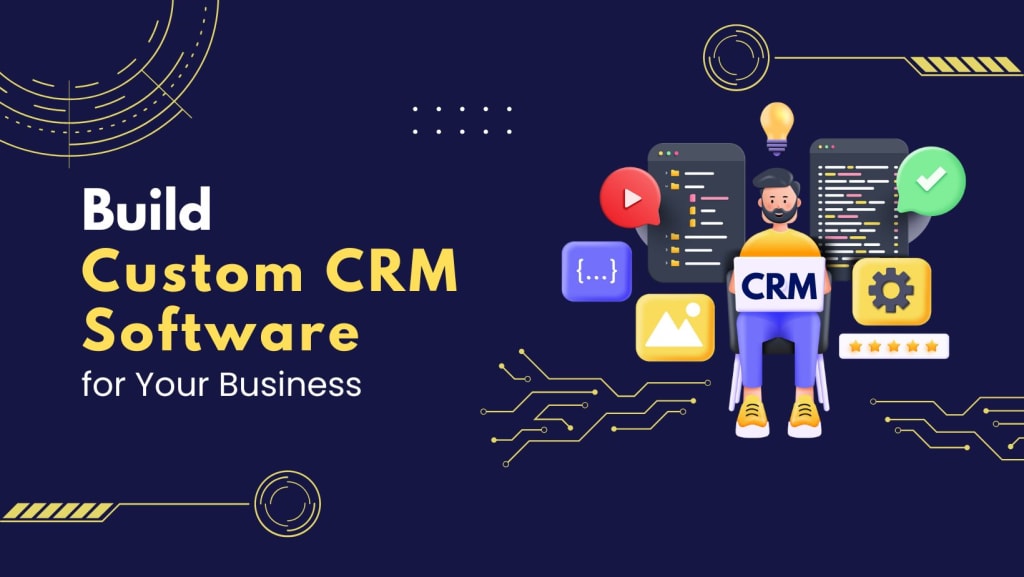How to Build Custom CRM Software for Your Business
Build Custom CRM Software for Your Business

In today's highly competitive business landscape, managing customer relationships efficiently is crucial for the success and growth of any company. Custom CRM software offers a tailored solution to streamline customer interactions, enhance productivity, and drive sales. By building custom CRM software for your business, you can leverage its benefits to meet your specific needs and gain a competitive edge in the market.
In this article, we will explore the process of building custom CRM software and the key considerations involved.
In this digital era, businesses need to manage customer relationships effectively to thrive. Custom CRM software empowers organizations to centralize customer data, automate processes, and improve customer satisfaction. This article will guide you through the process of building custom CRM software tailored to your business requirements.
Understanding Custom CRM Software
Custom CRM software is a specialized application designed to manage customer interactions, sales pipelines, and marketing activities. Unlike off-the-shelf CRM solutions, custom CRM software is built from scratch, considering the unique needs and workflows of your business. It provides flexibility, scalability, and customization options to align the software with your specific processes.
Benefits of Custom CRM Software
Implementing custom CRM software offers several advantages for your business, including:
- Enhanced Efficiency: Custom CRM software streamlines your business operations, automates repetitive tasks, and reduces manual effort, enabling your team to focus on high-value activities.
- Improved Customer Experience: By centralizing customer data, custom CRM software enables personalized interactions, timely follow-ups, and targeted marketing campaigns, resulting in improved customer satisfaction.
- Data-Driven Insights: With custom CRM software, you can track and analyze key metrics, generate reports, and gain valuable insights into customer behavior, sales performance, and marketing effectiveness.
- Scalability: Custom CRM software can be scaled as your business grows, accommodating increasing data volumes, user accounts, and functionalities.
- Competitive Advantage: Tailored CRM software gives you a competitive edge by aligning with your unique business processes and providing features that differentiate you from competitors.
Key Features to Consider
When building custom CRM software, it's essential to identify the key features that align with your business requirements. Some crucial features to consider include:
- Contact and Lead Management: Efficiently manage customer contacts, track leads, and automate lead nurturing processes.
- Sales Pipeline Management: Visualize and manage your sales pipeline, track deals, and automate sales activities.
- Task and Activity Tracking: Assign tasks, set reminders, and track team activities within the CRM system.
- Reporting and Analytics: Generate reports, analyze data, and gain insights into customer behavior, sales performance, and marketing effectiveness.
- Integration Capabilities: Ensure seamless integration with other business systems such as email marketing tools, e-commerce platforms, and customer support software.
- Mobile Compatibility: Enable access to the CRM system on mobile devices, allowing your team to stay productive on the go.
Choosing the Right CRM Development Company
To build a successful custom CRM software, it's crucial to partner with the right CRM development company. Consider the following factors when selecting a CRM development company:
- Experience and Expertise: Look for a company with a proven track record in CRM software development and a deep understanding of your industry.
- Customization Capabilities: Ensure the development company can deliver a highly customized CRM solution tailored to your specific business needs.
- Scalability and Support: Choose a company that offers scalability options and provides ongoing maintenance and support for your CRM software.
- Security Measures: Ensure the development company follows industry best practices to protect your data and provides robust security measures in the CRM software.
- Client References: Request client references and testimonials to gauge the development company's reputation and client satisfaction.
Steps to Build Custom CRM Software
Building custom CRM software involves several essential steps. Let's explore the process in detail:
Step 1. Defining Your Business Requirements
Before starting the development process, clearly define your business requirements and objectives. Identify the specific features, functionalities, and workflows you need in your CRM software.
Step 2. Designing the CRM System
In this phase, create a comprehensive design for your custom CRM software. Consider the user interface, data architecture, and system integrations. Collaborate with the development team to ensure the design aligns with your business goals.
Step 3. Development and Integration
Once the design is finalized, the development team will start building your custom CRM software. They will integrate the necessary modules, configure workflows, and develop custom features to meet your requirements.
Step 4. Testing and Quality Assurance
Thorough testing is crucial to ensure the functionality, performance, and security of your custom CRM software. The development team will conduct comprehensive testing and quality assurance processes to identify and fix any issues.
Step 5. Deployment and Training
After successful testing, your custom CRM software is ready for deployment. The development team will assist in the smooth rollout of the software and provide training to your team members to ensure proper utilization.
Step 6. Ongoing Maintenance and Support
Building custom CRM software is an ongoing process. The development company will provide regular maintenance, updates, and technical support to ensure the optimal performance of your CRM system.
Data Security and Privacy
Data security and privacy are critical considerations when building custom CRM software. Implement robust security measures such as encryption, access controls, and regular data backups to protect sensitive customer information.
Integration with Existing Systems
To maximize the effectiveness of your custom CRM software, integrate it with existing business systems such as email marketing tools, accounting software, and customer support platforms. This integration streamlines processes and ensures data consistency.
User Adoption and Training
Successful implementation of custom CRM software requires user adoption. Conduct training sessions and provide ongoing support to ensure your team understands the system's benefits and effectively utilizes its features.
Measuring Success and ROI
Regularly monitor key performance indicators (KPIs) and measure the success of your custom CRM software. Analyze metrics such as increased customer satisfaction, improved sales performance, and reduced operational costs to gauge the return on investment (ROI).
Conclusion
Building custom CRM software for your business can revolutionize how you manage customer relationships, drive sales, and streamline operations. By following the outlined steps and partnering with the right CRM development company, you can create a tailored solution that aligns with your unique business needs. Leverage the power of custom CRM software and gain a competitive advantage in today's dynamic business landscape.
FAQs
Q1: What is the difference between custom CRM software and off-the-shelf CRM solutions?
Ans: Custom CRM software is built from scratch to meet specific business requirements, offering flexibility and customization options. Off-the-shelf CRM solutions are pre-built software that caters to general needs but may lack the customization options of a custom solution.
Q2: Can custom CRM software be integrated with other business systems?
Ans: Yes, custom CRM software can be integrated with various business systems such as email marketing tools, e-commerce platforms, and customer support software to streamline processes and ensure data consistency.
Q3: How long does it take to build custom CRM software?
Ans: The time required to build custom CRM software depends on the complexity of your business requirements. It can range from a few weeks to several months.
Q4: Is it necessary to provide training to the team after implementing custom CRM software?
Ans: Yes, training is crucial to ensure user adoption and effective utilization of the custom CRM software. It helps your team understand the system's benefits and use its features efficiently.
Q5: How can I measure the success of my custom CRM software?
Ans: You can measure the success of your custom CRM software by monitoring key performance indicators (KPIs) such as increased customer satisfaction, improved sales performance, and reduced operational costs. Analyzing these metrics helps gauge the return on investment (ROI).
About the Creator
William Smith
I am an informative tech blogger exploring a wide range of topics, including web, mobile, IoT, etc.






Comments
There are no comments for this story
Be the first to respond and start the conversation.